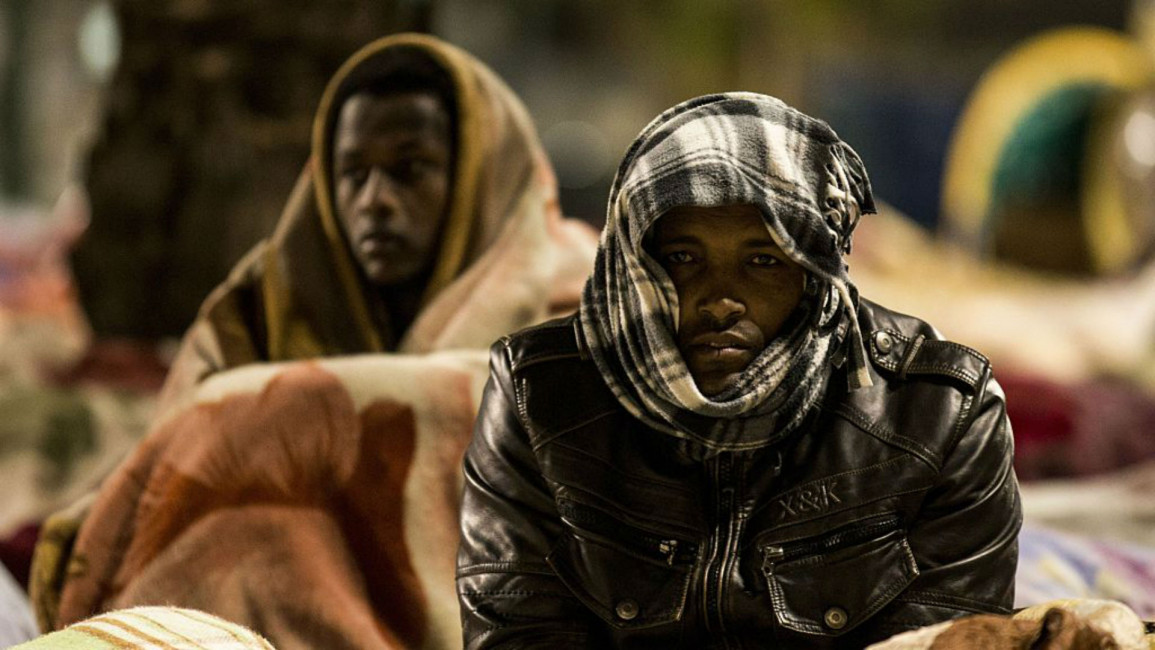Protests in Israel over 'dangerous' deportation of 40,000 African migrants
Left wing Israelis and American Jewish allies have criticised an Israeli government plan to deport tens of thousands of African migrants, saying that Israel should never turn away those in need.
The showdown could come to a head on April 1, when the state plans to start expelling Africans, some of whom have been in Israel for years, to an uncertain fate.
Israel is set to expel nearly tens of thousands of Africans in a migrant relocation plan that has been described by the UN as "incoherent and unsafe".
The plan, originally introduced in November, will see the 38,000 African migrants, mainly Eritrean and Sudanese, who have entered the country illegally, leave by the end of March.
African migrants have been promised a plane ticket and $3,500, however those that miss the deadline and refuse to leave, will face arrest.
The Israeli government insists that all but a few are economic migrants, however critics have slammed the plan, saying they are mostly bona fide refugees fleeing persecution and that kicking them out would threaten their lives.
The website of the Aid Organisation for Refugees and Asylum Seekers in Israel (ASSAF) says that of 10,000 asylum requests from Eritreans in Israel, only seven have been granted, while one Sudanese has received asylum.
It does not state the number of Sudanese applicants, but government figures from October 2016 list 8,066 Sudan nationals among the migrants.
ASSAF says that there are "thousands" from the Darfur region of western Sudan among those seeking asylum in Israel whose applications have yet to receive an answer.
"Incoherent and unsafe"
The plan was widely criticised when first unveiled last year, but the UN refugee agency [UNHCR] sounded a fresh alarm after Israeli Prime Minister Netanyahu's announcement early this month that the program had begun.
"UNHCR is again appealing to Israel to halt its policy of relocating Eritreans and Sudanese to sub-Saharan Africa," the agency said in a statement.
Israel has not clearly said where the migrants will go, but tacitly recognises it is too dangerous to return the Sudanese and Eritreans home.
A 2016 UN commission of inquiry into Eritrea's regime found "widespread and systematic" crimes against humanity and said an estimated 5,000 people flee the country each month.
The International Criminal Court has indicted Sudanese President Omar al-Bashir on charges of war crimes, crimes against humanity and genocide linked to his regime's counter-insurgency tactics in the 14-year-old Darfur conflict.
As a result, according to activists in Israel, it has signed deals with Rwanda and Uganda, which agree to accept departing migrants on condition they consent to the arrangement.
Uganda has publicly denied any such deal. Rwanda has also dismissed its involvement, according to the UN.
UNHCR spokesman William Spindler said the fact that the purported host countries were denying their role made it impossible for the UN to follow up.
UNHCR said it had spoken to 80 people who were flown with the $3,500 to Rwanda before heading north, travelling to Rome through conflict zones in South Sudan, Sudan and Libya.
"Along the way they suffered abuse, torture and extortion before risking their lives once again by crossing the Mediterranean to Italy," UNHCR said in a statement, explaining that its staff interviewed the migrants in Rome.
Spindler called on Israel to find alternative solutions to the problem, stressing that the UN was ready to help with formal resettlement through official channels.
Israel said earlier in the month it will pay almost $9,000 dollars to citizens who help in the forced expulsion of asylum seekers.
The job entails the "enforcement of laws against asylum seekers and their employers. Their job would be to find them, record their stories and investigate the employers as well".
"Experience in combat or security is a plus", the statement added.
Racism and remembrance
A sharp shift to the right in Israeli politics has given rise to an increasingly vocal push to isolate African asylum seekers and ultimately return them to their homelands. Darfur and Eritrea, being the majority, are both riddled by instability, long running conflicts and political oppression.
Between January 2016 to March 2017, a total of 311 citizens of Sudan and Eritrea were detained without trial.
Nationalist anti-immigration protests regularly turn violent with random beatings of Africans and the ransacking of their properties or shops.
Demonstrators have chanted slogans such as: "Stop talking, start expelling" and "Blacks out!", while other protesters have derided the "bleeding-heart leftists" working to help them.
Netanyahu noted that after building a fence on the Egyptian border and deporting some 20,000 African migrants through various deals, Israel has reached the third stage of its efforts - "accelerated removal".
"This removal is taking place thanks to an international agreement I reached that enables us to remove the 40,000 infiltrators remaining, remove them without their consent," he told ministers.
Holocaust survivors however have appealed to Netanyahu to cancel his plan to forcefully expel tens of thousands of African migrants, citing their own experiences as outcasts.
"We, who know precisely what it's like to be refugees, to be homeless and bereft of a state that preserves and protects us from violence and suffering, cannot comprehend how a Jewish government can expel refugees and asylum seekers to a journey of suffering, torment and death," the 36 signatories wrote in an open letter.



